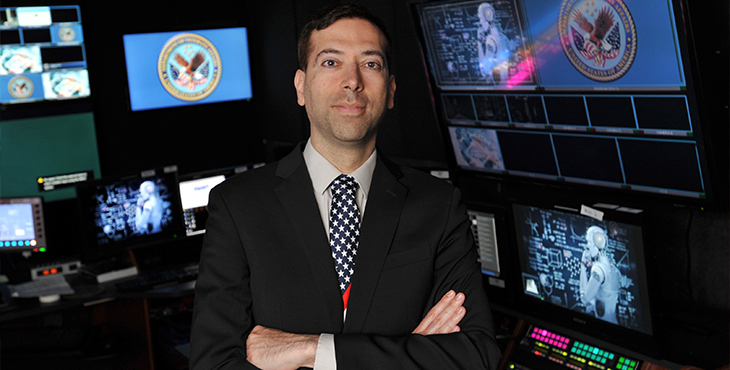The blog post below is adapted from a longer article in VA Research Currents.
When Facebook suggests a new friend for you, or Gmail shows you ads based on your email content, or Alexa or Siri understands your verbal command to do some chore in the house, that’s artificial intelligence at work.
Or, for a more dramatic example, think of driverless cars that read traffic and make lightning-fast decisions to stay on course and avoid accidents.
Basically, artificial intelligence (AI) means using computers to simulate human thinking. Computers will never be able to fully replicate the human mind in all its amazing nuance, speed, and complexity—at least most people hope not!—but scientists have made remarkable strides in teaching computers to handle tasks such as finding patterns in data, analyzing and weighing risk factors, choosing the best option from among many choices, predicting future events based on past ones, and solving problems.
Many familiar examples come from the business sector. But the technology is also enabling progress in government, including VA. For example, through the REACH VET program, VA uses AI to scan medical records and look for signs of Vets at high risk for suicide. And remember IBM Watson, of “Jeopardy!” fame? The robot has been helping VA doctors interpret cancer lab results and suggest the best drugs.
Now an effort is underway to widen the role of AI in VA care and research. To that end, VA has appointed its first-ever director of artificial intelligence. Based in the Office of Research and Development, Dr. Gil Alterovitz has degrees from MIT and Carnegie Mellon in electrical, biomedical, and computer engineering. He is also a professor at Harvard Medical School and the Computational Health Informatics Program at Boston Children’s Hospital. His overarching career interest is “bridging engineering and medicine,” he says.
Alterovitz is a sharp thinker, with clear ideas on how to roll out AI to help Vets. No fuzzy logic here.
“Given how health care is evolving, AI is really the only way to move forward in terms of reducing costs and providing better care,” says Alterovitz.
Much of his work will be in the realm of big data. He has been working closely with Dr. Scott DuVall, who is based at the VA Salt Lake City Health Care System and heads the VA Informatics and Computing Infrastructure, or VINCI.
The duo has been working to fulfill one of the strategic goals for VA Research: putting VA data to work for Veterans.
A prime example is the Million Veteran Program. MVP has already collected genomic and health data from more than 750,000 consenting Veteran volunteers, and the plan is to continue to enroll Veterans and others past the million mark. MVP is already one of the world’s largest genomic databases.
It’s easy to see how sorting through hundreds of thousands of health records and genetic results, looking for clues to solve Veterans’ health problems, would be too much for any human team.
Training computers to do the work, with the help of AI, is far more practical. Quickly combing through the myriad of records, each containing thousands of data points, the machines could figure out that Veterans with health condition X who carry genetic variant Y respond really well to medication Z. That’s just one example of the knowledge that could be gained.
Yet another important AI area that Alterovitz plans to focus on is cancer imaging. It turns out computers can do a great job of reading CT scans and other medical images. “We’ve found that AI can see things that clinicians don’t see until much later,” says Alterovitz.
That holds promise for detecting cancer early on, and for learning how to tell—based on imaging and other test results—which tumors are likely to spread.
“There’s a lot of exciting work in imaging diagnostics with deep learning, outside the VA, and lots of potential within VA,” says Alterovitz. “But there’s not a lot of activity right now within VA. It’s perhaps a little under-represented. Sometimes images are stored locally, and they’re not accessible [to experts at other locations with AI expertise.] These technologies are new, and we need to bring them into VA.”
He emphasizes that the goal is for AI to support and augment health care professionals, not replace them. In the case of cancer imaging, he says AI “can educate physicians on what to look for.”
All in all, Alterovitz is optimistic AI will have a huge impact on VA research and care within the next few years.
“This is all relatively new. People are realizing that once we develop these capabilities, there’s so much more we can do.”
To read the full article, visit VA Research Currents.
Topics in this story
More Stories
In a new series that highlights advancements in VA health care, VA researchers and clinicians are appearing on a Veteran-themed media platform—Wreaths Across America Radio—to tout their critical work.
Recently published findings from the VA Disrupted Care National Project [...]
Diverse representation of women in health care research allows MVP to make discoveries for women’s health






A I is a LONG way from perfection in almost ALL areas! But just because it now is an existing factor it seems like lots of folks want to just believe all it comes up with. The ads mentioned that Google pops into your page is a good example. If you read an article that just has some mentions of, say bicycles, not the title of article, it will start trying to sell bicycles to you!!!
The weather forecasts are another A I phooey. It sees a front coming at such a speed and automatically thinks when it will arrive at my feet, although it is not seeing one going the other way towards it that will turn it or flatten it!
And so now the VA in a move to turn my healthcare over to Alexis is in that same boat, albeit the same one with all the holes in it!
Sgt Whataiknow